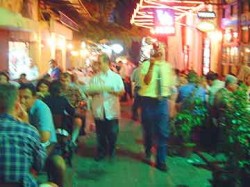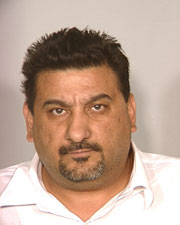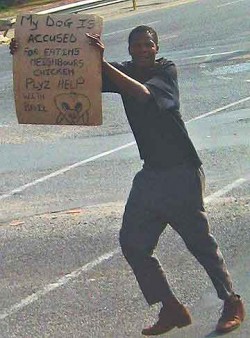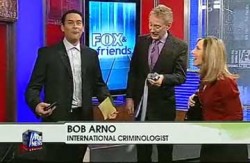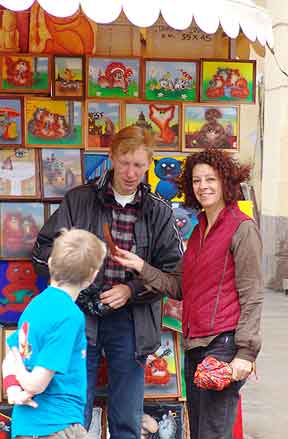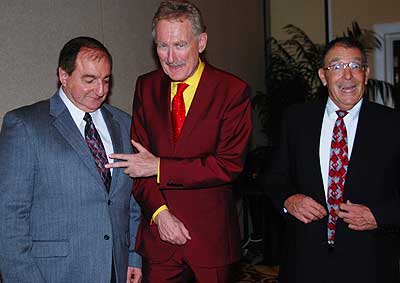We good citizens are trained from an early age to respect authority. It’s not easy to ask a uniformed policeman for identification, or even a plainclothes officer who flashes a badge. And if we were to request ID, how closely would we scrutinize it? Would we detect a fake? What about identification in a foreign language, Thai for example, or Russian?
What’s the difference, anyway, between a pseudo cop—an impostor—and a legitimate but corrupt official? Both rely on their perceived authority, both act fast (before they’re found out, by the victim or others), both do the shake-down dance in one form or another. We, the good citizens, never see it coming. “It all happened so fast,” one victim told me, “I knew something wasn’t right, but I didn’t have time to think.” We’re more than victims of crime here. We’re victims of our upbringing, we who are taught to follow rules and obey laws.
Bob and I were accosted by pseudo-cops in Russia. I can tell you, it’s frightening, especially when the scene expands to include additional players. Sydney’s had them, and so has Barcelona. Stockholm’s in the news now with pseudo cops stationed at ATMs frequented by seniors, collecting PIN codes under the guise of “regulation.”
BBC News reports a horrific scam that takes place in the Bangkok airport. A number of travelers browsing the duty-free shops have been accused of shoplifting, put in jail holding cells, and forced into negotiations that amount to police extortion in exchange for their release. They’re being tricked into relying on the advice of a man who seems to be a police accomplice.
One of the victims in this report, Stephen Ingram, was taken by airport security to a police office, put in a cell overnight, then given an interpreter. The interpreter took him (and his travel companion) to a police commander who attempted extortion of over US$12,000 and threatened a prison stay of two months before they’d even get their case heard. After paying a portion of the “bail,” Mr. Ingram and his travel partner were put into a hotel and told not to leave, not to contact a lawyer or their embassy, and cautioned that they were being watched. They eventually escaped and got the their embassy, where they learned they’d been victims of a classic Thai scam called the “zig-zag.”
An Irish woman was subjected to the same scam when she made a small purchase at the duty-free shop. She bought an item of makeup, which the shop clerk put in a bag; a customary practice, right? On leaving the shop she was surrounded by security guards shouting ‘You! You! You go jail six months.” The shopping bag contained an item not paid for. Did she steal it? Did the shop clerk plant it? Did the guards? The woman was held overnight “in filthy conditions,” and eventually had to pay up to free herself and her passport.
In her case, the Irish woman thought she had purchased two items. She paid by credit card but didn’t pay attention to how many hundreds of baht she was charged. Did the shop clerk intentionally charge for only one item, as a set up? Why, otherwise, did security immediately pounce on this customer?
Both of these examples begin with the company called King Power, which runs the airport duty-free shops, and both include collusion by government officials and others. King Power has tried to substantiate some of its accusations with surveillance video, and has three cases “explained” on its website.
In an article in the Irish Daily Mail, Andrew Drummond wrote that in Thailand (where he is based), this is called the “Monopoly scam, ”
not so much because of the high amounts of money involved but the fact that victims…could buy …˜Get out of jail’ cards to escape airport shoplifting charges. These …˜cards’ were letters issued by the local prosecutor and police.
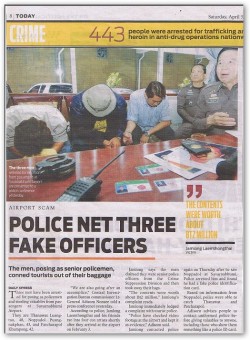
Bangkok airport, it seems, is infested with scammers, corrupt officials, and according to the pictured article, pseudo-cops. There are more horror stories:
Paul Grant and Lynn Ward, both from the UK, separately reported another Bangkok airport scam. In this one, incoming passengers are instructed by a customs officer to put their duty-free items into their checked luggage when they retrieve it from the carousel, and that they should not declare the items, “or they will be prosecuted for smuggling.” When exiting the customs area, other customs agents “discover” the undeclared items, and levy hefty fines or threaten jail. ATMs are conveniently located beside the customs office, or travelers are escorted to machines in order to withdraw the large sums charged.
If you haven’t read this or another warning specifically about the shake-downs in Bangkok’s airport, you haven’t got a chance should you be chosen to be a victim.
![]()






